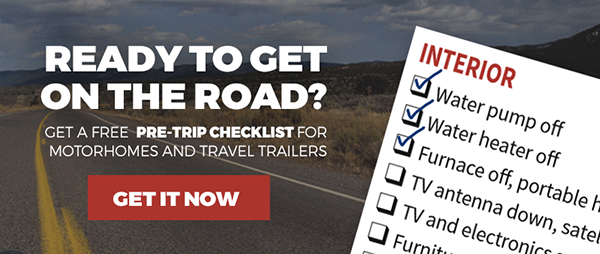There are thousands of used RVs out there for sale, and many of them are in great condition, being sold because of health problems and a myriad of other reasons. This creates an opportunity for savvy shoppers to save thousands of dollars compared to a new unit. Here are some tips for buying a used RV to keep in mind when preparing to start shopping.
Related article: Tips for Selling an RV – How Much is it Worth, Anyway?
Determine Your Budget
First, before you start shopping, decide realistically what you can afford. Maintain a reserve in your budget for repairs and other expenses, such as taxes and license fees, and since used rigs don’t usually come with a warranty, they may need some costly repairs.
Decide on RV Type
Next, decide the size and type of RV that you want, such as a pop-up trailer, fifth-wheel or conventional trailer, slide-in camper or motorhome. Of course a camper or fifth-wheel will require a pickup truck. A good way to familiarize yourself with what is out there, besides walking around campgrounds, is to attend RV shows and visit large RV sales lots.
Consider Your Tow Vehicle
Avoid overloading your tow vehicle, if you will be using one. Use the gross vehicle weight rating of the trailer as the actual towed weight to prevent exceeding the tow vehicle’s tow rating. Look up the tow rating of your vehicle in advance.
Consider Where to Look
There are more ways now than ever to shop for an RV, including printed publications, online classified ads and searches, plus dealers, newspapers, and online sites such as eBay. Traveling far to look at a rig (and transporting it home) can be costly, and the expense of getting there can tempt you to buy a rig that you shouldn’t. Therefore try to find RVs for sale nearby.
Avoid Scams
Unfortunately there are many scams that buyers need to be wary of, and purchasing a rig without seeing it from an unknown seller is risky at best. Avoid buying from persons not listed on the title (except licensed dealers) and those with long, convoluted stories. There are good legitimate deals on the Internet, but always perform a thorough pre-purchase inspection. If a deal seems too good to be true, it probably is.
Related videos: RV Buying Guide
Perform an Inspection
A thorough pre-purchase inspection is crucial. Look the RV over carefully in daylight. Bring along a friend who’s knowledgeable about RVs. Check inside and out, on top and underneath, looking for signs of damage, dry rot, rust, leakage, and other problems. Look in each storage compartment and closet, and under sinks, beds. and sofas.
Check ceilings for signs of water damage and sidewalls for de-lamination – all are very expensive to fix. Check every system and item possible, including exterior and interior lights, gauges, TVs, and audio systems.
Test all coach systems, including generators, batteries, converters, inverters, solar panels, water systems, refrigerators, air conditioners and heaters, stoves, microwaves, hot water heaters, and other appliances. Operate all slide-out rooms through their full range of travel. Use a checklist and make notes.
Inspect the tires for wear and cracking or separation. Read the dates – they are the last four digits after “DOT” such as 1312. The 13 would indicate the tire was made during the thirteenth week of the year, and the 12 indicates it was made in 2012. Tires older than six years are due for replacement due to deterioration.
Related article: RV Tire Care Tips: Don’t Take Your Tires for Granted
Many storm and flood-damaged coaches have been cleaned up and put on the market. Water leaves lasting damage and electrical and mechanical components will probably fail early, and mold and mildew are difficult to eliminate. Look for any signs of dampness or rust that indicate flooding.
Unless you have a lot of RV mechanical and electrical experience, take the RV to a shop you trust for a pre-purchase inspection (PPI) before buying. They can inspect brakes and suspension components, check for signs of body damage repairs, leaks, and overall condition.
Afterward you can take the inspection report back to the seller and use it for negotiating a final price. A PPI can save you from major problems and thousands of dollars in repairs.
Related video: All About Your RV Water Heater
Settle All Paperwork
Ask questions and insist on direct answers; evasive replies are a red flag. Ensure the title is clear and all paperwork including registrations and bills of sale are in order. Match the vehicle identification number on the title to the actual VIN on the vehicle. Determine if any warranties are still in effect and are transferable. Carefully inspect the original title to ensure it has no liens on it, nor is marked junk, salvage, flood, or another designation. Ask for a photo ID driver’s license which matches the information on the title, and record the seller’s details.
Great deals are out there, just waiting for you. With a little effort, planning, and due diligence, you can save thousands of dollars by purchasing a used RV, while obtaining an excellent vehicle.
More related videos:Buying a Used RV: Inspecting a Slide Room
Buying a Used RV: Front End Inspection Tips
Buying a Used RV: Roof Inspection
Buying a Used RV: Chassis Inspection
Buying a Used RV: Interior Inspection
Buying a Used RV: Appliance Inspection












I couldn't agree more. Our seller stood in the kitchen so we we wouldn't notice the sagging floor. Also desalination has occurred.
Vehicle battery
My RV dash air not cold a/c compressor is running but gauges shows high like 100 it is not cycling and wan`t take any Freon what is stopped up?
I was a little disappointed that although you mentioned taking the RV to a dealer or mechanic for inspection, you failed to suggest a Certified National RV Inspection Association Inspector for a prepurchase inspection. I have been doing these inspections for over 6 years, I am a mechanical engineer and a Registered Technician with RVIA/RVDA. All NRVIA Level 2 inspectors are fully trained in what to look for and over the last few years,I have saved my clients' thousands of $$ by not buying the wrong RV. They found the one that was great and they love it. Others bought with confidence after an inspection that gave them peace of mind. So please, add have an inspection done by a member of the NRVIA.
<strong> Ticket: 33461 - I need to replace worn decals. Mfg. Says they are not available any longer, but can probably get them for newer model. Are there other options?
Tips re: this coach
My water heater has stopped working. It won't heat the water. Should I try and fix it, or should I replace it. I think it is the original 2005 water heater.
Getting ready to start looking for our first class a motorholme.
Where do I find the VIN
Where can I find new strip.